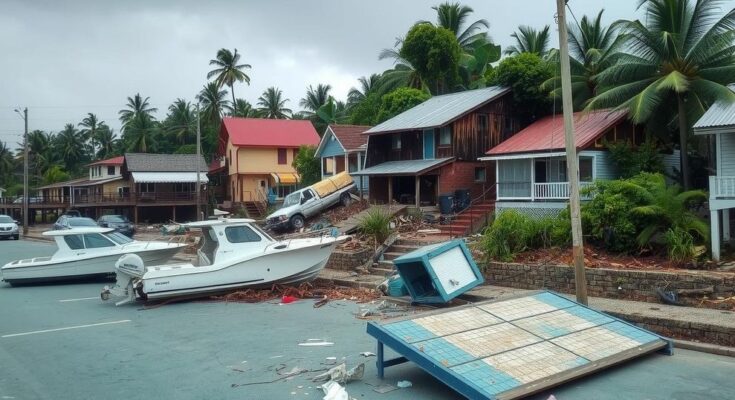Cyclone Chido has caused extensive damage and a feared death toll in the hundreds in Mayotte. With winds reaching over 220 km/h, this Category 4 cyclone has led to significant destruction, particularly in impoverished neighborhoods. Rescue teams are being deployed as the community begins to assess the catastrophic impact, illustrating the urgent need for global support in disaster recovery efforts amid climate change concerns.
The recent devastation caused by Cyclone Chido has left hundreds feared dead in Mayotte, a French overseas territory in the Indian Ocean. François-Xavier Bieuville, the Prefect of Mayotte, stated that the death toll could reach as high as several thousand. The cyclone, described as the most severe to strike the island in ninety years, has caused catastrophic damage to infrastructure, particularly impacting poor neighborhoods. Rescue efforts are ongoing, with additional teams dispatched from France and neighboring territories to assist in recovery operations, which includes restoring critical services such as electricity and clean water.
Cyclone Chido struck Mayotte on Saturday, unleashing winds exceeding 220 km/h (136 mph) and causing widespread destruction. The intensity of the storm made it a Category 4 cyclone, the second strongest on the scale. Initial reports estimate a minimum of 11 fatalities and over 250 injuries; however, officials anticipate these numbers will rise significantly as access to affected areas improves. In Mayotte’s slum areas, where many inhabitants live in precarious housing, the situation has become dire, prompting concerns over a much higher human toll than currently reported.
As the cyclone continues its path, affecting northern Mozambique and posing further risks to millions, French officials including President Emmanuel Macron, have expressed condolences and support for the residents of Mayotte. Emergency response teams are being coordinated, and nearly 1,600 security personnel have been mobilized to aid in the humanitarian efforts and prevent potential looting amid the chaos. The aftermath of this cyclone highlights not only the immediate need for assistance but also the long-term vulnerabilities faced by impoverished regions in the face of climate change and extreme weather events.
Cyclone Chido recently struck Mayotte, resulting in extensive human and material losses. Mayotte, an economically disadvantaged French territory, has a population of over 300,000 and is known for its informal housing structures, which have suffered devastating impacts. The cyclone, categorized as severe, serves as a stark reminder of the increasing frequency and intensity of such weather events attributed to climate change, with significant implications for vulnerable regions. This disaster exacerbates ongoing humanitarian crises, particularly in countries like Mozambique, which also face the effects of the storm.
Cyclone Chido has unleashed devastating consequences in Mayotte, with the current death toll feared to be in the hundreds and possibly escalating. Emergency response efforts are critical in addressing the immediate needs of the affected population, particularly in restoring essential services. The situation compels urgent reflection on the implications of climate change, as storms of this magnitude increasingly burden impoverished nations that contribute minimally to global warming but face the greatest repercussions. Continued support and resources from wealthier nations are essential in aiding these communities in crisis.
Original Source: www.cbsnews.com




